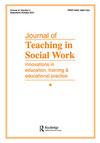社区大学田野调查学生中“开始归属”的职业前身份:有抱负的社会工作者的理论框架
IF 0.9
Q3 EDUCATION & EDUCATIONAL RESEARCH
引用次数: 0
摘要
摘要社区大学人力服务专业的学生构成了社会服务和社会工作队伍中大量新生和未来的专业人员。人力服务副学士学位为学生进入这个工作场所或开始四年制大学课程做准备。令人遗憾的是,这些重要的未来提供者在受经济和社会不平等影响的学生中所占比例过高。他们往往是年轻的第一代大学生,专业经验有限。培养职业认同感可以帮助这些学生为职业生涯做好准备,并在学业上取得成功。虽然对高年级和社会工作研究生的职业认同发展进行了深入研究,但对社区大学生在人类服务领域的研究却很少,这使得我们对支持他们社会工作愿望的教育学最佳实践的理解存在差距。本研究根据Barretti的职业社会化模型,基于社区大学生在现场实习中的40篇定性反思性期刊文章,提出了一个职业认同的理论框架,以填补这一空白。本文章由计算机程序翻译,如有差异,请以英文原文为准。
“Beginning to Belong” Emerging pre-professional Identity among Community College Fieldwork Students: A Theoretical Framework for Aspiring Social Workers
ABSTRACT Community college human services students comprise a significant number of nascent and future professionals for the social services and social work workforce. An associate degree in human services prepares students either to enter this workplace or to begin a four-year college program. Regrettably, these important future providers are overrepresented among students affected by economic and social inequality. They are often young, first-generation-to-college students, and have limited professional experience. Developing a sense of professional identity can help these students prepare for a career and achieve academic success. While professional identity development among senior level and graduate social work students is well studied, there is a paucity of research with respect to community college students in the human services, leaving a gap in our understanding of best practices for pedagogy that would support their social work aspirations. This study helps to fill this gap by proposing a theoretical framework for professional identity adapted from Barretti’s Professional Socialization Model and based on 40 qualitative reflective journal entries from community college students in field placement.
求助全文
通过发布文献求助,成功后即可免费获取论文全文。
去求助
来源期刊

Journal of Teaching in Social Work
EDUCATION & EDUCATIONAL RESEARCH-
CiteScore
1.20
自引率
0.00%
发文量
36
期刊介绍:
The Journal of Teaching in Social Work fills a long-standing gap in the social work literature by providing opportunities for creative and able teachers—in schools, agency-based training programs, and direct practice—to share with their colleagues what experience and systematic study has taught them about successful teaching. Through articles focusing on the teacher, the teaching process, and new contexts of teaching, the journal is an essential forum for teaching and learning processes and the factors affecting their quality. The journal recognizes that all social work practitioners who wish to teach (whatever their specialty) should know the philosophies of teaching and learning as well as educational methods and techniques.
 求助内容:
求助内容: 应助结果提醒方式:
应助结果提醒方式:


